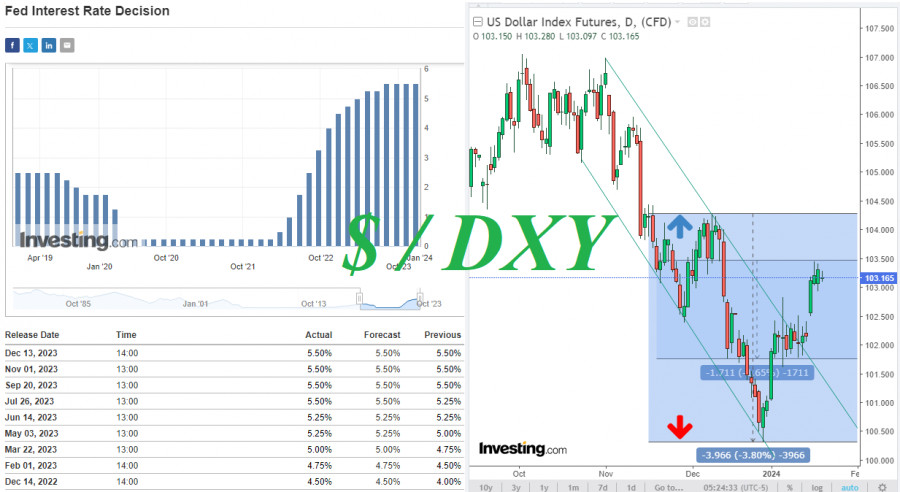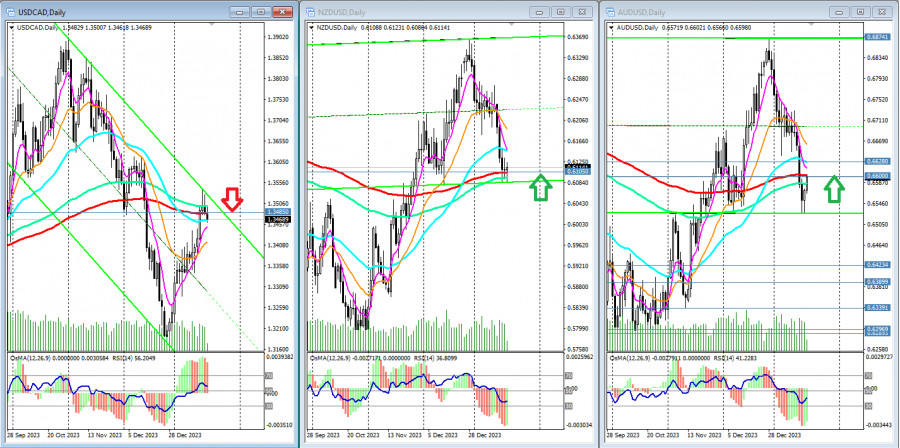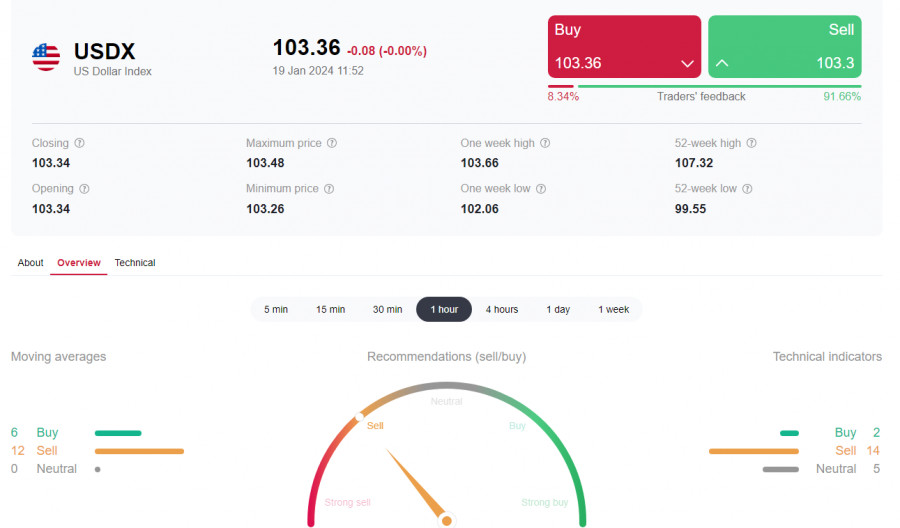

 19.01.2024 03:24 PM
19.01.2024 03:24 PMAt the end of the week, the U.S. Dollar Index (DXY) remains in a range, standing slightly above (by 16 points) the 103.00 mark as of this writing. Meanwhile, the dollar itself, while remaining stable against European currencies, is declining against major commodity currencies such as the Australian, New Zealand, and Canadian dollars.
These currencies, in turn, have resumed their growth against the backdrop of rising U.S. stock indexes, commodity prices, and the dollar's fall against the Chinese yuan.
The strengthening of commodity currencies against the U.S. dollar is also facilitated by technical factors: the pairs USD/CAD, NZD/USD, AUD/USD, as a result of sharp movements, have reached key medium-term resistance/support levels of 1.3485, 0.6105, 0.6600, respectively, which is often followed by a rebound.
The strong bullish impulse for the dollar that emerged at the beginning of the week due to the sharp escalation of the geopolitical situation in the Middle East and the Red Sea region seems to be gradually fading. However, a new escalation of the military conflict in Gaza or a new exchange of strikes by the U.S. and the Houthis could once again trigger a surge in interest in buying the safe-haven dollar. It is possible that Monday may open with another gap in such a case.
Today, investors will be monitoring the release (at 15:00 GMT) of the preliminary Consumer Sentiment Index from the University of Michigan. An increase in the index is expected in January, rising to 70 from 69.7 in December, which could give the dollar a short-term boost.
Also, note that there will be no statements from the Fed over the weekend in anticipation of the meeting on January 31–February 1 (the so-called "quiet week").
Everything that the members of the Federal Reserve's leadership wanted to say regarding the prospects of the U.S. Central Bank's monetary policy, they have already done so. Specifically, Raphael Bostic, head of the Atlanta Fed, said on Thursday that the base scenario involves a cut in rates somewhere in the third quarter, but care must be taken not to lower rates prematurely or risk reigniting the price spiral.
Other Fed leaders have previously expressed similar sentiments about the market's premature expectations of the Fed's monetary policy easing. For example, Fed official Christopher Waller stated the day before that the inflation target of 2.0% is "within reach," but it is premature to rush changes in the interest rate, as it is still unclear whether the inflation slowdown is sustainable. In his opinion, the Fed should act cautiously to avoid economic shocks.
Statements made by Fed officials the day before reduce the likelihood of the start of monetary policy easing at the March meeting. Now it stands at less than 60%, according to CME Group data, compared to a 75% probability at the beginning of the week.
In turn, the dollar received support from the weekly jobless claims data published on Thursday. For the reporting week, the number of initial claims fell from 203,000 to 187,000 (forecasted at 207,000), and the number of continuing claims (for the week of January 5) fell from 1.832 million to 1.806 million (forecasted at 1.845 million). The data suggest that the U.S. labor market retains resilience despite the high interest rates set by the Fed, which, along with the resurgence of inflation, prompts the U.S. Central Bank to postpone the start of monetary policy correction to the second half of the year.
週一沒有安排任何宏觀經濟事件——無論是在美國、歐元區、德國還是英國。因此,即使市場在關注宏觀經濟環境,今天也沒有任何相關事件。
星期五,英鎊/美元貨幣對持續上升。如果我們在高點之外看到這種價格走勢,那麼就不會有疑問。
週五,歐元/美元貨幣對沒有出現任何顯著波動。這並不令人意外,因為週五是耶穌受難日,週日則是復活節。
隧道的盡頭是否有光明?美國美元在新的一周將再次嘗試回答這個問題。簡要回顧:過去兩個月,美國貨幣也沒有缺乏利好的消息。
英國最近發布了幾份相當有趣的報告,但幾乎未對市場參與者的行動造成影響。在週三的下半天之外,英鎊的需求在所有五天內均有所增加。
上週歐元的變化很少。我們觀察到大部分時間都處於橫向移動,這自然不會影響當前的波浪標記。
美國總統唐納德·特朗普昨天表示,他可以解雇聯邦準備理事會主席杰羅姆·鮑威爾,這引發了對中央銀行獨立性概念的質疑。他還對決策者近月來沒有下調利率感到不滿。
目前,全世界都在關注美國與其主要貿易夥伴之間的談判進展。儘管特朗普總統大聲宣稱談判進展順利,但仍然沒有明確的結果,這加強了投資者和交易員的悲觀情緒,並對美元造成壓力。
电子邮件/短信
通知

Your IP address shows that you are currently located in the USA. If you are a resident of the United States, you are prohibited from using the services of InstaFintech Group including online trading, online transfers, deposit/withdrawal of funds, etc.
If you think you are seeing this message by mistake and your location is not the US, kindly proceed to the website. Otherwise, you must leave the website in order to comply with government restrictions.
Why does your IP address show your location as the USA?
Please confirm whether you are a US resident or not by clicking the relevant button below. If you choose the wrong option, being a US resident, you will not be able to open an account with InstaTrade anyway.
We are sorry for any inconvenience caused by this message.



